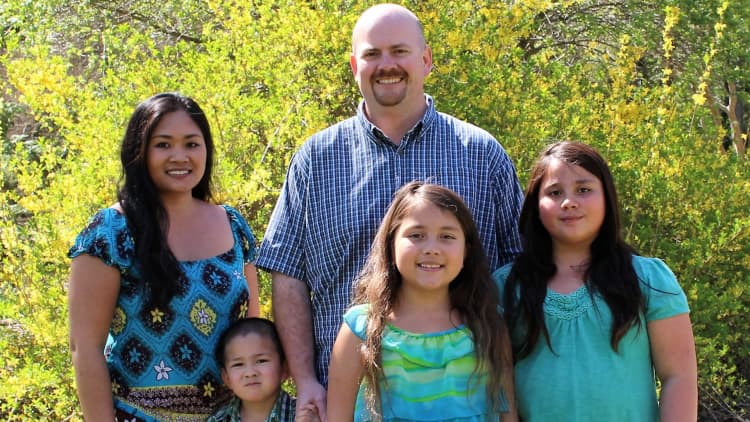The typical American retires at age 63. One Minneapolis-based millennial plans to shave more than 20 years off that average and retire by age 37.
Sean, who asked to remain anonymous, is well on his way to early retirement: By age 25, his net worth hit six figures, and today, at 28, he has more than $250,000 in the bank.
"No inheritances, no windfalls," he writes on his blog, My Money Wizard. "Just lots of saving, basic investment and a desk job in the finance industry that places my salary barely above the median household income."
He also graduated debt-free, thanks to scholarships and "extremely generous parents," he tells CNBC Make It. "I got a nice head start because of that." A head start worth more than $25,000: The average student loan burden in Colorado, where he spent his first two years out of college, is $26,520.
Still, his goal of retiring in a little less than a decade requires a lot of work. Here's how he plans to make it happen.

He started saving early
"I always thought that in order to have enough money to retire, or to be financially independent, you had to hit it big," says Sean.
His grandfather changed his perspective: "He didn't appear rich at all. He raised five kids, he drove old cars and he never made more than low five-figures." Yet he managed to save more than a million dollars, mostly thanks to compound interest, which causes your wealth to snowball over time.
"It really speaks to the power of starting early, living reasonably and of compound interest," says Sean, who made his first investment, in a CD, at age 16 and started seriously saving for retirement when he landed his first full-time job at age 23. Thanks to compounding, if the 28-year-old never saved or invested another cent, he calculated that his current savings would grow to more than $1 million by the time he reaches the "normal" retirement age of around 60.

He set a goal
It was Jacob Lund Fisker's book "Early Retirement Extreme" that motivated Sean to fast-track his retirement, partly because it pointed out that you don't necessarily have to be a multimillionaire to settle down early.
"I had always assumed, like most people, that I needed several millions of dollars to retire," he tells CNBC Make It. "Yet here the author was proving retirement was possible on far less than I ever imagined. It's not one size fits all for everybody — it depends on how much money you spend and what your expenses are."
Using the "4 percent rule" — the somewhat controversial formula many early retirees use to know how much money is enough to last — Sean figured he needed $750,000 in the bank to retire comfortably. That number is conservative and allows for "significant wiggle room in the budget," he tells CNBC Make It. That said, "the big curveball there is if I were to have family and kids."

He monitored his spending
Rather than sitting down and creating a strict budget that would help him reach his goal of $750,000, Sean started by tracking what he spent.
It's the first step anyone should take if they want to up their savings rate or gain control of their finances, he says: "You don't even have to say, 'I want to spend less on this.' Just track your spending and find out where your money is going. Once you do that, you're going to spot areas — you're going to look back at your bills and say, 'Oh my gosh, I can't believe I spent $400 dining out last month.' When you look at your final compilation, it's going to stick out like a sore thumb."
He records his purchases with the iPhone's Numbers app, but you can also use apps like Mint, You Need a Budget or Personal Capital.
Over time, as he logged all of his expenses, his savings rate naturally started to increase. When he first started tracking, he was saving about 35 percent of his earnings. But as he became more and more aware of exactly where his money was going, he became a more conscious and efficient spender. Today, he sets aside more than 60 percent of his income.

He banked his raises
Since graduating in 2013, Sean's income has increased from $50,000 a year to about $80,000. But just because he started earning more didn't mean he started spending more.
"I've kept my spending basically identical over those different raises," he tells CNBC Make It. "Whenever I get a raise, I just increase my 401(k) contributions or increase my automatic investment options. So I continue to build up that savings rate higher and higher, and the more you grow that savings rate, the faster you're going to reach financial independence."
It takes less discipline than you may think, he adds: "When you just automatically divert that raise to something else, your life doesn't change, so you don't feel like you're sacrificing in any way."
He kept fixed costs low
"If you look at my spending compared to most people, the two main areas I save the most on are housing and car payments," says Sean. He bought a car for $13,000 in cash, meaning he doesn't make any car payments. As for housing, for a while, he used to split rent with his girlfriend and pay a reasonable $640 a month. After buying a home in 2017, they now split a mortgage payment and each pay about $740 a month.
By keeping his fixed costs low, Sean has room to splurge occasionally. And that's key. He doesn't believe in depriving himself, since dining out and traveling make him happy. He spends $150 to $200 on restaurants per month and his miscellaneous expenses fluctuate between $400 and $1,500 a month, depending on travel costs.

He put his money to work
Sean's quarter-million in savings is spread out. He has about $14,000 in cash and the rest is invested in various accounts, he tells CNBC Make It: $104,000 in his company's 401(k) plan, $116,000 in a brokerage account and $24,000 in a Roth IRA. He posts a detailed breakdown of his net worth on his blog each month.
"A misnomer that people get from my story is, they see a 20-something with a quarter-million dollars and they immediately think, 'Oh, he must have made some amazing bitcoin investments or done some crazy stock trading strategy,'" says Sean. But he's done just the opposite and made simple investments.
"You don't have to be a stock-picking genius to invest," he says. "A lot of people think that you have to dive deep into the financials of a company in order to invest in the stock market. With the advent of low-fee index funds, you don't have to be an expert."

The smartest investment he's made, he says, is the simplest for most people to do as well: contributing the maximum to his 401(k) each year. "Investing directly into your 401(k) or similar pre-tax account drastically reduces your income in the eyes of the tax man," he explains. "I save over $6,000 per year in taxes just from maxing out my 401(k) contributions."
As for his withdrawal plan, "I plan on accessing my 401(k) and IRA before age 59 ½ through a Roth IRA conversion ladder," he writes on his blog. "I'll live off the taxable brokerage accounts while I wait the IRS-required five years."
While the millennial feels on track to retire at 37, "maybe my estimations will prove to be far too optimistic and my retirement will be set back 10 years," he says. "In which case, I'll still be retiring decades sooner than the few Americans who are actually planning for retirement."
And he doesn't expect to be sitting on a beach for the rest of his life. "That's not what I'm looking for," he says. "What I'm looking for is freedom. If I want to continue working, I can continue working. If I want to go off and pursue something else entirely, I can do that. For me, it's just about freedom."
Don't miss: 36-year-old retiree: A big paycheck doesn't lead to early retirement—here's what does
Like this story? Subscribe to CNBC Make It on YouTube!



